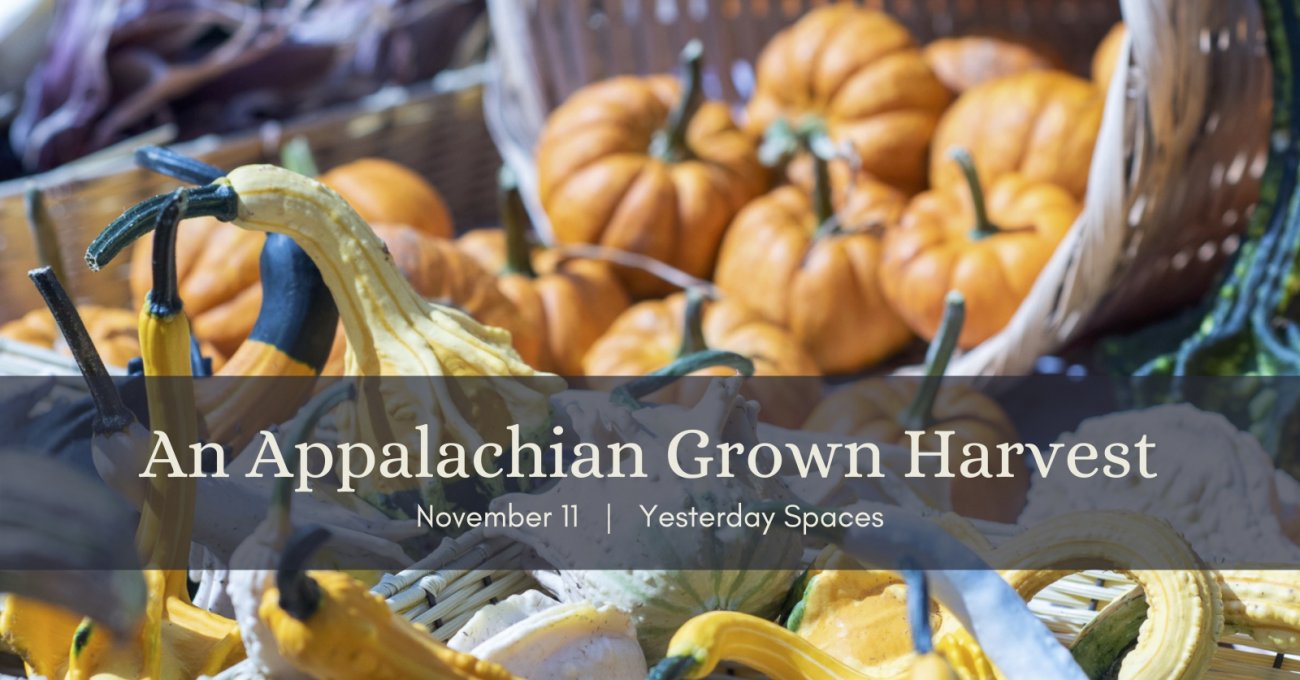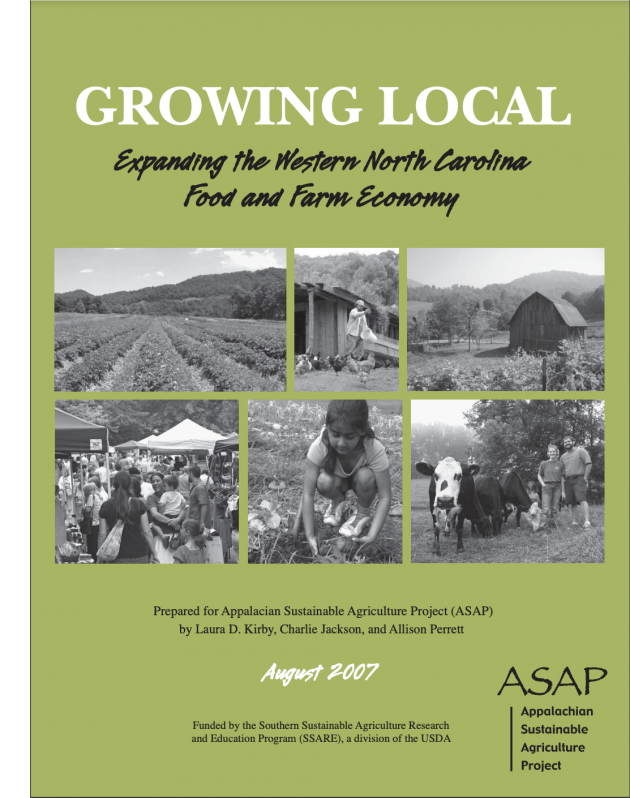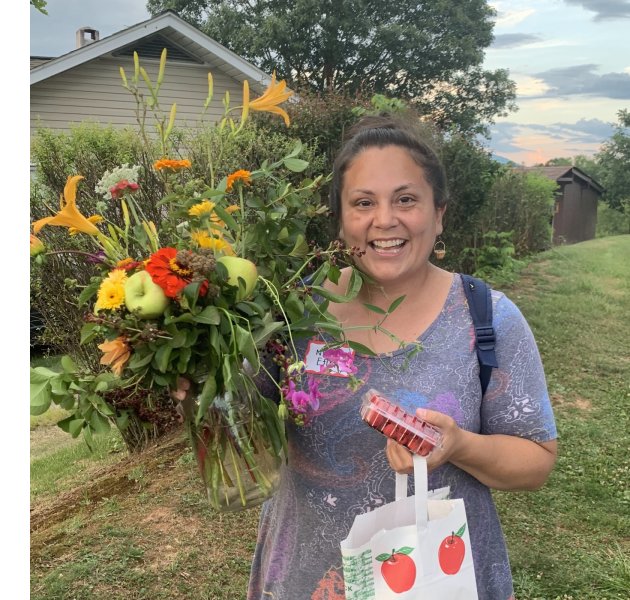|
|
|
monthly news from ASAP | OCTOBER 2022 | asapconnections.org
|
| |
|
|
A Few Tickets Left for An Appalachian Grown Harvest
|

Join us for a one-of-a-kind meal prepared by some of the area's best chefs, all sourced from local farms! There are only a few seats left for An Appalachian Grown Harvest on Nov. 11, so act quickly if you'd like to attend. Purchase tickets here.
The dinner, celebrating ASAP's 20-year anniversary, features dishes from chefs Melinda Aponte (YWCA of Asheville), K elsianne Bebout (BeeBowBakes and All Souls Pizza), Matt Caudle (Cúrate), William Dissen (The Market Place), Luis Martinez (Tequio Foods), Eric Morris (Cultura and Wicked Weed Funkatorium), and Jen Pearson (Guadalupe Cafe).
Friday, November 115 p.m. - farmer chat and cocktail hour with passed appetizers 6:30-8:30 p.m. - five-course dinner
Yesterday Spaces, 305 Sluder Branch Road, Leicester, NC
We're also looking for a few more volunteers to support the event, including for set-up, dishwashing, and serving (volunteers during the dinner shift will get to eat the meal, served family-style). If interested, find out more and sign up here.
|
|
 |
Save the Date! ASAP's Business of Farming Conference Feb. 11
|
Save the date! ASAP's 2023 Business of Farming Conference will be Saturday, Feb. 11, at the A-B Tech Conference Center in Asheville. Note that that's a little earlier than usual, in order to schedule around other farmer events this year! Look for registration details next month.
ASAP’s annual Business of Farming Conference brings together professional farmers from across the Southeast region to network and share resources to grow their farm businesses. Farmers learn about marketing, business planning, and financial management from regional experts and innovative peers. The conference is designed for beginning and established farmers as well as those seriously considering farming as a profession.
Does your business offer products or services for farmers? Consider sponsoring or exhibiting at the conference! A sponsorship showcases you as a leader of the local food movement, ensuring that farmers have the tools they need to grow and thrive. Both sponsors and exhibitors receive table space in the conference exhibitor hall to connect with more than 200 farmers at all stages of their careers. Email [email protected] to find out more about opportunities.
|
|
 |
Seeking Feedback on Double SNAP for Fruits and Vegetables
|
In 2022, ASAP continued to support Double SNAP for Fruits and Vegetables at eight markets in Western North Carolina. This program increases access to fresh, local food in our communities while supporting farmers and local food businesses.
We're looking for feedback from SNAP farmers market shoppers, vendors at markets with Double SNAP, and community members. Please share your impressions about the program in a short (2 to 5 minutes) survey. This feedback helps us improve and sustain the program. All answers will be kept confidential.
|
|
 |

Growing Minds Program Manager will plan and implement program activities in conjunction with a team, including workshops, training, and community engagement for ASAP's Growing Minds Farm to School program.
Graphic Design Coordinator will work collaboratively to coordinate the organization’s graphic design needs. Primary activities include designing and producing digital and print materials for ASAP’s programs, including the annual Local Food Guide publication, Appalachian Grown branding program, farmers market promotions, and support materials for events such as the Business of Farming Conference and Farm Tour.
Produce Prescription Assistant will provide operational and promotional support within ASAP’s Local Food Campaign with a special focus on the Farm Fresh Produce Prescription program (FFPP). Primary activities include providing ongoing program support to participants, health care providers, farmers market managers, and farmers, and creating and coordinating nutrition resources and engagement activities at farmers markets; and more.
|
|
 |
 20 YEARS OF ASAP 20 YEARS OF ASAP |
|  As part of ASAP's 20th anniversary celebration, each month we are sharing the origins of some of our programs. As part of ASAP's 20th anniversary celebration, each month we are sharing the origins of some of our programs.
A strong focus on research and evaluation has always informed ASAP’s work. The groundbreaking and influential “Growing Local” report, published in 2007 from a multiyear research project, identified a $400 million-plus market for local food in the region.
Want to get involved? Building on our 20 years of consumer research, we're looking for people to talk about local food values and connections in 20-minute interviews. You can sign up via this form or call 828-236-1282.
|
|
|
|
 FACES OF LOCAL FACES OF LOCAL |
| |  ASAP likes to share the stories of people who help us fulfill our mission. This October—which is National Farm to School month—we’re talking to Nichole Efird, a pre-K teacher with the Cherokee Elementary in the Qualla Boundary. Nichole is part of the 2022-23 Kenan Fellows Program for Teacher Leadership, which connects outstanding educators with mentors, creating opportunities and relationships to help students understand how STEM concepts apply in the real world. Nichole’s mentor is Jennifer Trippe, ASAP’s Growing Minds Program Director. She’s pictured at ASAP’s Farm Fresh for Health Regional Symposium at KT’s Orchard and Apiary. ASAP likes to share the stories of people who help us fulfill our mission. This October—which is National Farm to School month—we’re talking to Nichole Efird, a pre-K teacher with the Cherokee Elementary in the Qualla Boundary. Nichole is part of the 2022-23 Kenan Fellows Program for Teacher Leadership, which connects outstanding educators with mentors, creating opportunities and relationships to help students understand how STEM concepts apply in the real world. Nichole’s mentor is Jennifer Trippe, ASAP’s Growing Minds Program Director. She’s pictured at ASAP’s Farm Fresh for Health Regional Symposium at KT’s Orchard and Apiary.
What kinds of farm to school activities do you do with your pre-K students?
I love ASAP’s Growing Minds Farm to Preschool Toolkit! It has some really amazing lesson plans that are engaging and aligned to early childhood standards. I implement as many farm to school activities as possible throughout the school year. A few fruits and vegetables we learn about include apples, pumpkins, corn, and berries—life cycles, recipes, and all of the products that come from these items. I share everything I can about fresh produce, including making cultural connections to how the Cherokee people grew and used many different crops. I also like to visit local farms so that my young students have the opportunity to connect with the farmers in our community.
During our recent study on apples I had one student ask if they could grow apples at their house. It opened up a group discussion about where to find apples and who had apple trees at their house. That same student made the connection and it was amazing. She said, “So if I grow an apple tree, I will always have some apples!” It was a proud teacher moment for me!
What’s going on in the garden right now?
Our garden is going through a transition right now. The students that helped to build the original garden have moved up a grade. The students that I have now got to enjoy the fruits of their labor. We were able to harvest our corn, green beans, squash, and a ton of marigolds after school started back in the fall. I spent the summer tending the garden to make sure it was ready for the new year. After we gathered our produce, we had a garden clean-up. We share the space with the high school ag program and Life Skills class. We are going to bring in fresh soil, repair garden boxes and complete some much-needed upgrades to the area. We will be able to replant in the spring.
What are some of the ways you’ve brought your experiences as a Kenan Fellow with ASAP’s Growing Minds back into the classroom?
As a lifelong learner, I am always interested in growing as an educator, learning and processing how I can use new content in my classroom. One area that I wanted to grow in was my knowledge of how the Cherokee people used and implemented various agricultural practices and to ensure that we have future generations of Cherokee farmers. I felt like there was a great opportunity to start a love of agriculture in the early years instead of waiting to get students interested in the topic in middle or high school. Being a part of the Kenan Fellows Program for Teacher Leaders has opened so many doors for me to grow in this area. Partnering with ASAP for my internship has provided me with a wealth of knowledge on local farms, farm resources, and what it truly means to eat local. The internship has given me the opportunity to build community partnerships with these local farmers, learn about all of the items grown in Western North Carolina and how much these farms do. I am able to take these experiences back into the classroom through new lesson plans, hands-on, inquiry-based learning activities, and new vocabulary with the addition of Cherokee language.
|
|
|
|
 RECIPE OF THE MONTH RECIPE OF THE MONTH |
|
Chef Luis Martinez's Baked Sweet Potato
|
|
Luis Martinez is the owner of Tequio Foods, which imports heritage products from Oaxaca, Mexico, in a manner that honestly and deeply supports independent, indigenous farmers. His background includes working on farms, in restaurants, and as a graphic designer. Now based in Asheville, Luis is combining his love for cooking with his passion for social justice.
"This recipe is simple but brings back childhood memories," says Luis. "Back in Oaxaca, it’s super traditional to eat sweet potatoes with sweet condensed milk. You can find a cart selling this everywhere. I chose Ten Mile Farm as the provider of sweet potatoes for this recipe. Ten Mile is female owned and operated. I like that, because in the agriculture industry is hard to find a farm where the leadership is female. They focus on rotating crops, which is vital to keep healthy soil. Also, we need more businesses that focus on breaking the pattern of using chemical fertilizers and other nasty stuff for our health."
Ingredients
- 1 medium garnet sweet potato
- 1 tablespoon sweetened condensed milk
- 2 teaspoons chopped toasted pecans
- 2 teaspoons chopped dark chocolate
- 1/4 teaspoon cinnamon
Directions
- Preheat oven to 400°F. Pierce sweet potato several times with a fork. Place the sweet potato on a rimmed baking sheet lined with foil. Bake for about 45 minutes or until the sweet potato is completely tender and oozing.
- Make a slit on the top of the sweet potato. Mash down each side and add toppings: sweetened condensed milk, pecans, dark chocolate, and cinnamon. Enjoy warm.
|
|
|
|
 MEDIA HIGHLIGHTS MEDIA HIGHLIGHTS |
| In 2021, Smoky Mountain Mangalitsa participated in ASAP's Farm Tour. The overstock of pork belly they were unable to sell to restaurants amid the pandemic was used to make tacos that were sold to visitors. "We had people coming back the second day [of the Farm Tour] just for the tacos. We sold out both days. And then this year we had a repeat performance and people came and said, ‘I’ve been waiting for this all year. I’m coming just for the tacos—I want eight.’ We sold out again and sold maybe another 30 percent. It was a resounding success.”
—Farmer Catherine Topel, speaking to the Asheville Citizen Times about why she is attending the Food Truck Boot Camp
"For home cooks, consider purchasing a turkey and other ingredients from WNC farmers and producers. Check out Appalachian Sustainable Agriculture Project's local turkey guide for information on farm preorders, including how to reserve Hickory Nut Gap Farm’s pasture-raised broad-breasted white turkeys."
|
|
|
|
|
|
|
| | |
ASAP's mission is to help local farms thrive, link farmers to markets and supporters, and build healthy communities through connections to local food.
|
|
|
|
|
|
|
|
|
|
|